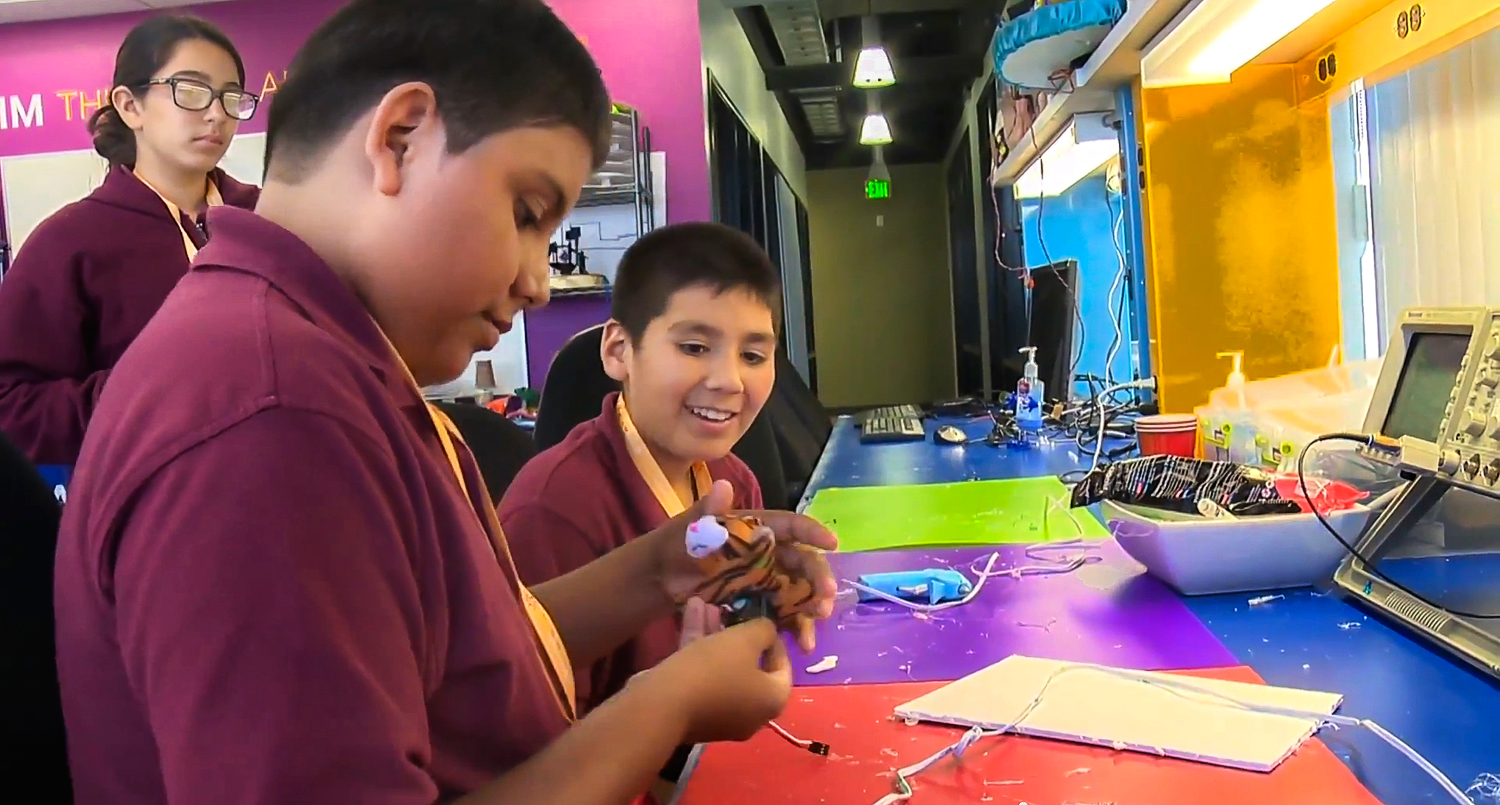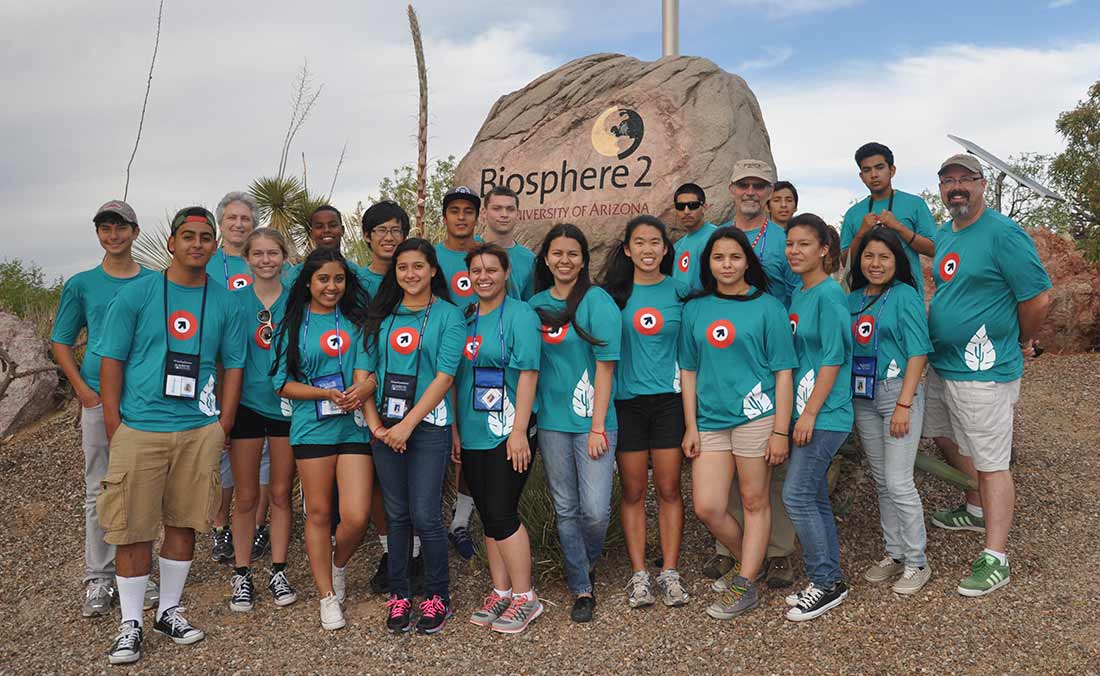
By:
- John B.B. Freeman
Published Date
By:
- John B.B. Freeman
Share This:

Thinkabit Lab Brings World of Creative Engineering to Middle School Students
A group of curious middle-school students at Feaster Middle STEAM Academy in Chula Vista recently was immersed into a world of creative engineering via Thinkabit Lab, an outgrowth of UC San Diego’s K-16 Programs.
A hands-on lab, Thinkabit adds an “A” for art to the traditional STEM curriculum of science, technology, engineering, and mathematics. Taught at Qualcomm's headquarters in Sorrento Valley, the coursework inspires students to be creative while they learn to grasp complex engineering concepts.
Saura Naderi, a UC San Diego engineering physics graduate who later helped launch MyLab at Calit2’s Qualcomm Institute, instructs the sessions, motivating her students to enjoy the process of designing and coding as they build imaginative projects.
“It never ceases to amaze me what these kids come up with,” says Naderi, an engineer and career development specialist at Qualcomm, which presents the programs. “They don’t have limits in their own head. To give these kids that flexibility and that empowerment, it’s probably one of the first times in their childhood they get to own something that’s completely theirs.”
A current UCSD-TV video, titled “STEAM Powered: Fueling Student Interest in Engineering,” profiles the sessions at Feaster School, one of the first schools to participate in Thinkabit Lab. Throughout the year, K-16 Programs will present similar on-site programs to area schools.
Founded in 2010, K-16 Programs also directs Academic Connections, which this summer will again present its successful three-week immersion program at UC San Diego. Geared toward high-achieving high school students, the college-level curriculum includes such courses as bioinformatics, mechanical engineering, fluid mechanics, and marine biology – subjects not usually offered at most area high schools.
Instructors are UC San Diego doctoral students who design and then personally instruct the coursework. Students interact with top-tier researchers, instructors and graduate students in their classes and labs.
K-16 Programs also offers “Global Environmental Leadership and Sustainability,” a series of summer immersion courses at the University of Hawai’i-Hilo, the University of New Mexico (Los Alamos) and the University of Arizona (Biosphere 2).
An expanded version of the course will be offered this summer, presented in partnership with Scripps Institution of Oceanography. Students will study for one week in San Diego, followed by a second week in Washington, DC.
“I’m exceptionally proud that we’ve positively impacted the lives of tens of thousands of young people,” said Abeyta, who’s also assistant dean of community engagement at Extension. “What’s most fulfilling to me and our staff is that we’re integral to the intellectual growth and personal development of the next generation of college graduates.”
Academic Connections, which instructed more than 500 students from all over the world in 2014, is part of a larger strategy by Chancellor Pradeep K. Khosla to connect with diverse communities and establish closer academic ties to the university.

The scientific wonders of Arizona’s Biosphere 2 came alive for these participants.
The origins of the Academic Connections program date back to 2001 when Luciano Corazza, a visiting education professor from Johns Hopkins University, founded a summer residential learning program at UC San Diego aimed at top high-school students. The program was a cooperative venture between Extension and UC San Diego Office of Student Affairs.
“That first year, we had 137 students, including one from England,” recalled Abeyta, who was involved in the initial start-up. “Our vision has always been to expose these students to a level of education that they wouldn’t normally receive in high school.”
Reality Changers, a local non-profit foundation that partners with Academic Connections to serve low-income students who aspire to attend college, also traces its origins to 2001.
That’s the year that the group’s founder, Christopher Yanov, was inspired after taking a course taught by Extension Dean Mary L. Walshok. Though at the time he only had $300 to his name, Yanov was well on his way to earning four college degrees in five years, including from UC San Diego (’99) and the University of San Diego.
“He was absolutely determined to give back to his neighborhood,” recalled Walshok. “So I suggested a pathway for him to think about how he could transform his ideas into a working reality. He’s truly created a force for good that benefits deserving young people.”
Since then, Reality Changers has helped more than 500 local students – low-income and at-risk – obtain college scholarships and financial aid packages valued at $60 million.
Chancellor Khosla’s office has enabled many of these students to receive discounted fees to the program, which, in turn, serves as a pipeline for scholarships to UC San Diego. In addition to Reality Changers, K-16 Programs partners with the following non-profits, among others:
- Jacobs Center for Neighborhood Innovation
- Barrio Logan College Institute
- San Diego Youth Symphony
- Promise to Kids
- Imperial Valley Unified School District
“Each of these partnerships reflect our commitment to serving the wider community,” said Abeyta. “Together, we provide a foundation of confidence so that our pre-college students believe in themselves and their abilities.”
Academic Connections Programs
(Discounted rates available for UC San Diego employees)
Three-week Intensive Residential Summer Program for High School Students on UC San Diego campus
- Program schedule: July 12-Aug. 1, 2015
- Who may attend: Students presently in 9th, 10th, 11th or 12th grades
- Application fee: $200 (non-refundable)
- Tuition: $3,700 (residential); $2,700 (non-residential)
Sustainability Residential Programs and Global Environmental Leadership Programs
- Three one-week programs – University of Hawaii-Hilo (Aug. 2-10); University of Arizona, Biosphere 2 (June 21-28); and University of New Mexico, Los Alamos Labs (July 22-29)
- One two-week program – UC San Diego (July 5-11) / Washington DC (July 12-19)
Who may attend Academic Connections?
Students who are entering 9th, 10th, 11th, or 12th grade by July 1, 2015 are eligible to apply. Applicants must have a cumulative GPA of 3.3 or higher and provide a recommendation from a teacher or counselor for the Research Studies component and a cumulative GPA of 3.8 or higher for the Research Scholars component.
Are financial assistance scholarships available?
Because this self-supported program does not receive any state or federal funding, we are unable to offer financial aid, scholarships, or grants to program participants.
How do I apply to Academic Connections?
Applications at academicconnections.ucsd.edu for Academic Connections 2015 will be accepted until Friday, June 12, 2015 or until courses are full.
Share This:
You May Also Like
Stay in the Know
Keep up with all the latest from UC San Diego. Subscribe to the newsletter today.


